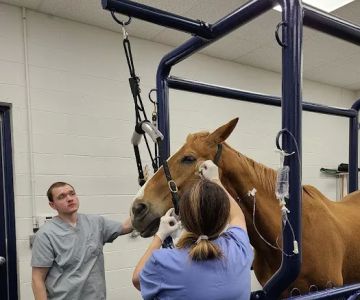What is a Veterinary Radiologist?
Have you ever wondered how veterinarians figure out what's going on inside your pet's body? Often, it’s the job of a veterinary radiologist to help with that crucial diagnosis. These medical professionals are veterinarians who specialize in interpreting medical imaging, such as X-rays, MRIs, and ultrasounds, to diagnose conditions in animals.
The Role of a Veterinary Radiologist
A veterinary radiologist is a specialist who works closely with other veterinarians to provide detailed imaging of an animal’s internal organs, bones, and tissues. Their expertise allows them to detect abnormalities, such as fractures, tumors, or internal bleeding, which can often be difficult to diagnose through physical exams alone.
Training and Expertise of a Veterinary Radiologist
Becoming a veterinary radiologist is a long process. These professionals first need to complete a veterinary degree, followed by advanced training in radiology, often in the form of a residency program. After completing their training, veterinary radiologists are required to pass certification exams, which allows them to work with the latest diagnostic imaging technologies.
Why Veterinary Radiologists are Crucial for Pet Health
Just like human doctors rely on imaging specialists for accurate diagnoses, veterinarians depend on veterinary radiologists to help them see the “hidden” aspects of your pet’s health. For instance, a pet might seem to be in pain, but without imaging, it can be hard to determine if the issue is a broken bone or something more serious like a tumor. A veterinary radiologist will analyze the images, making recommendations that can be critical for your pet’s treatment plan.
Common Conditions Diagnosed by Veterinary Radiologists
Veterinary radiologists are skilled at diagnosing a range of conditions in animals. Some common examples include:
- Fractures: X-rays can reveal broken bones and the extent of fractures.
- Tumors: Both benign and malignant growths can be detected using imaging techniques.
- Heart and lung conditions: Radiographs and ultrasound can assess the health of these vital organs.
- Arthritis and joint issues: Imaging helps detect the presence of inflammation or degeneration in the joints.
Types of Imaging Techniques Used by Veterinary Radiologists
There are several imaging techniques that veterinary radiologists commonly use, including:
- X-rays: The most commonly used tool for diagnosing fractures, joint problems, and lung issues.
- Ultrasound: This imaging method uses sound waves to create pictures of soft tissues and organs like the liver and kidneys.
- CT scans: These provide detailed images of an animal’s internal structures, especially when X-rays aren’t clear enough.
- MRIs: Magnetic resonance imaging is used for soft tissue issues, such as spinal problems or brain conditions.
How to Find a Veterinary Radiologist for Your Pet
If your veterinarian recommends a veterinary radiologist for your pet, they’ll likely have a network of trusted professionals to refer you to. You can also search for certified veterinary radiologists through organizations like the American College of Veterinary Radiology (ACVR). Many veterinary specialists also work at teaching hospitals or large veterinary clinics that offer imaging services.
Conclusion
Veterinary radiologists play an essential role in diagnosing and treating pets, offering a level of expertise that helps ensure your furry friend gets the care they need. Whether it’s through routine check-ups or emergency situations, a veterinary radiologist can provide the answers that will guide your pet’s treatment.
If you’re interested in learning more or need assistance finding a veterinary radiologist near you, don’t hesitate to consult your local veterinary clinic or check out resources from trusted organizations. Remember, when it comes to your pet’s health, timely and accurate diagnosis is key!











